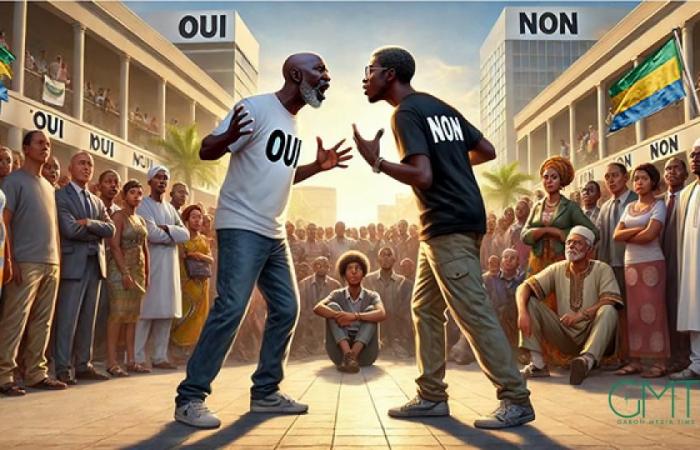Less than a week before the constitutional referendum vote scheduled for Saturday, November 16, 2024, questions remain, the day after the debate organized between two camps of Gabonese people frozen in their positions of “ Oui » and “ Non “. Beyond the laborious nature of the television sequence delivered to the public, the fact remains that the balkanization of opinion today seems to reduce a complex question to a simplistic dichotomy.
The revision of the Gabonese Constitution proposed by the transitional government and the Committee for the Transition and Restoration of Institutions (CTRI) is a crucial phase in the history of our young democracy. And this is because the fundamental aspects of the political organization of the country must be established by this fundamental law. However, the majority of Gabonese people have not had the opportunity to delve deeper into the real scope of these changes.
What Yes/No without understanding?
This is the question on the lips of international observers and even informed citizens of the Gabonese public scene. And all the more so since the current campaign seems to boil down to a binary choice: “ Oui » for reform and “ Non » for his rejection. However, this simplification of the debate only fuels collective ignorance and, at the same time, citizens' feeling of disconnection from a reform that they perceive as decided ” from above » without real prior popular consultation.
However, it is at this level that the CTRI would benefit from establishing its so-called republican approach. Because should we remember that we are at a time when the credibility of institutions is at stake? It has therefore become imperative to offer the Gabonese a real opportunity to understand the issues of the proposed text. If positive signals had been announced, the facts overcame the timeline of the Ministry of the Interior and Security. To date, no clear and detailed explanatory campaign has emerged with the same intensity as Yes/No.
However, it seems obvious that this educational initiative would have been the best approach to allow the Gabonese to truly understand the reform project and to form an informed opinion. Instead, the communication seems to focus exclusively on a clash between the “ Oui » and the “ Non “. And this, without any real effort to explain the ins and outs of each proposed modification. Let us remember that the issue here is not simply to know whether to accept or reject the text, but to understand what this reform implies for the institutional future of Gabon.
The essence of a new constitution
We should immediately remove from gregarious minds that this is a simple choice of posture. But much more a reflection on the way in which powers will be redefined and exercised on a national scale. At this level of responsibility, only a local campaign, with information sessions in neighborhoods, villages and schools, would have made it possible to respond to these concerns. The Gabonese would thus have had the opportunity to question experts, political actors, but also citizens involved in the process to better understand the nature of the proposed reforms.
Unfortunately, once again, the democratization of the constitutional process came down to the organization of a referendum resulting in “ Oui “. Have we learned the lessons of 1993? Such a popular consultation implies an impartial pedagogical approach. The choice of Yes or No being perceived as the result of a hint in phase with the proposition. Therefore, the voter is an active citizen and not a spectator. Constitutional reforms should be an opportunity to strengthen dialogue with the population, to openly discuss societal choices and ways of governing, and not to reduce this approach to an arbitration between two opposing camps.









